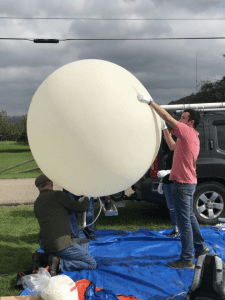
Wicked Device gets $1.7M for Global Curriculum Data Analysis
The Air Quality Egg, a grapefruit-sized air quality monitor developed by the Rev: Ithaca Startup Works member company Wicked Device, will help students around the world learn to share, analyze and interpret data.
Wicked Device recently received a $1.7 million National Institutes of Health grant to conduct research on the efficacy of a data-literacy program for high school students. Already used in more than 70 locations in New York state, the Air Quality Egg could become the first educational platform through which high school students can share data globally.
“We live in a data-rich world,” said Wicked Device CEO Dirk Swart. “It’s our responsibility to teach students how to understand and manage data, even if it’s only at a very basic level.”
In the program, which is being conducted with Robin Wilson of Pennsylvania State University’s Cancer Institute, high schoolers around the world will collect and analyze epidemiological data from Wicked Device’s platform to share findings, simulating the way the scientific community works. Owners can view data from all eggs worldwide in real time for comparison.
Air Quality Egg has the potential to impress upon students the importance of collaboration, Swartz said. “A hundred years ago it might’ve been true that you could sit in a basement for three years and emerge with the next big idea,” he said. “That is just a myth nowadays. Science is an inherently collaborative and cooperative endeavor.”
you could sit in a basement for three years and emerge with the next big idea,” he said. “That is just a myth nowadays. Science is an inherently collaborative and cooperative endeavor.”
In another partnership, college-bound high school students in Hawaii will use Air Quality Eggs to analyze temperature and humidity data. The students will be members of the Upward Bound program, which enrolls low-income high schoolers and future first-generation college students. Wicked Device will host their air quality data, which will be valuable in light of Hawaii’s recent volcanic activity.
The company hopes the egg will not only teach students how to use and interpret data, but inspire them to protect the environment. “We live in a country where global warming is questioned somehow – that’s just baffling to me,” said Swart. “But it’s reality and we must deal with reality. We can’t tell students global warming is real and it’s human-caused – that’s not going to have any traction. But what we can do is teach them to be data literate and then put data in front of them and say, hey, tell me what you think.”
Wicked Device was established in 2010 by Victor Aprea, M.Eng. ’04 and Swart. More than 2,000 eggs have been sold and are being used in more than 70 locations statewide, including by school districts in Tompkins County, the Paleontological Research Institution and several Board of Cooperative Educational Services locations. Wicked Device has also developed a curriculum designed to meet the Next Generation Science Standards, which have been adopted by 19 states and the District of Columbia.
The company is collaborating with Cornell’s Department of Earth and Atmospheric Sciencesand sent an egg into the atmosphere on October 6 to collect data on pre-cloud humidity and failed clouds, which are thought to play a role in weather prediction. This data has the potential to enable the field of climatology to better predict extreme weather events.
